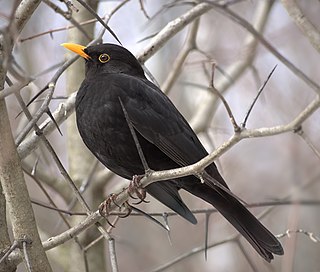
True thrushes are medium-sized mostly insectivorous or omnivorous birds in the genus Turdus of the wider thrush family, Turdidae. The genus name Turdus is Latin for "thrush". The term "thrush" is used for many other birds of the family Turdidae as well as for a number of species belonging to several other families.

The Pachycephalidae are a family of bird species that includes the whistlers, shrikethrushes, and three of the pitohuis, and is part of the ancient Australo-Papuan radiation of songbirds. The family includes 64 species that are separated into five genera. Its members range from small to medium in size, and occupy most of Australasia. Australia and New Guinea are the centre of their diversity and, in the case of the whistlers, the South Pacific islands as far as Tonga and Samoa and parts of Asia as far as India. The exact delimitation of boundaries of the family are uncertain, and one species, the golden whistler, has been the subject of intense taxonomic scrutiny in recent years, with multiple subspecies and species-level revisions.

The pitohuis are bird species endemic to New Guinea. The onomatopoeic name is thought to be derived from that used by New Guineans from nearby Dorey (Manokwari), but it is also used as the name of a genus Pitohui which was established by the French naturalist René Lesson in 1831. The unitalicized common name however refers to perching birds that belong to several genera of multiple bird families. The genera include Ornorectes, Melanorectes, and Pseudorectes apart from Pitohui.
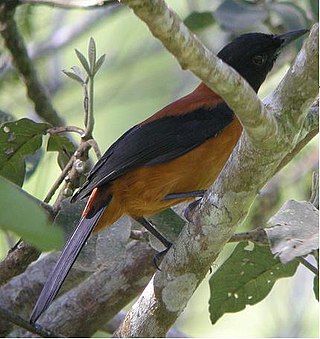
The hooded pitohui is a species of bird in the genus Pitohui found in New Guinea. It was long thought to be a whistler (Pachycephalidae) but is now known to be in the Old World oriole family (Oriolidae). Within the oriole family, this species is most closely related to the variable pitohuis in the genus Pitohui, and then the figbirds.
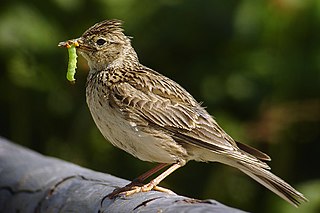
Alauda is a genus of larks found across much of Europe, Asia and in the mountains of north Africa, and one of the species endemic to the islet of Raso in the Cape Verde Islands. Further, at least two additional species are known from the fossil record. The current genus name is from Latin alauda, "lark". Pliny the Elder thought the word was originally of Celtic origin.

Lanius, the typical shrikes, are a genus of passerine birds in the shrike family Laniidae. The majority of the family's species are placed in this genus. The genus name, Lanius, is derived from the Latin word for "butcher", and some shrikes are also known as "butcher birds" because of their feeding habits. The common English name "shrike" is from Old English scríc, "shriek", referring to the shrill call.

The rusty pitohui is a species of bird in the family Pachycephalidae. It is found throughout the lowlands of the Aru Islands and New Guinea.
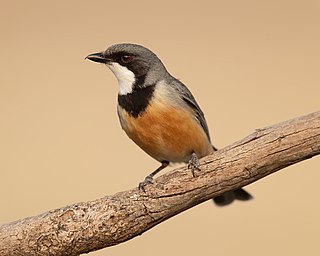
The rufous whistler is a species of whistler found in New Caledonia and Australia. Predominantly a reddish-brown and grey bird, it makes up for its subdued plumage with its song-making ability. Like many other members of the Pachycephalidae, it has a variety of musical calls.

A shrikethrush, also spelled shrike-thrush, is any one of eleven species of songbird that is a member of the genus Colluricincla. They have nondescript, predominantly brown or grey, plumage, but are accomplished singers, their calls described as "strong, mellow and beautiful." Shrikethrushes are generally insectivorous, though have been recorded eating molluscs and berries. They build cup-shaped nests in the forks of trees.

The morningbird is a songbird species in the family Pachycephalidae.

The drab whistler is a species of bird in the family Pachycephalidae. It is found in the Maluku Islands. Its natural habitat is subtropical or tropical moist lowland forests.

The piping bellbird, or crested pitohui, is a species of bird in the family Oreoicidae. It was previously placed in the family Pachycephalidae.

The white-bellied pitohui is a species of bird in the family Pachycephalidae. It is found throughout the lowlands of southern New Guinea (Lorentz River to upper Fly River.

The black pitohui is a species of bird in the monotypic genus of Melanorectes in the family Pachycephalidae. It is found throughout the highlands of New Guinea. Its natural habitat is subtropical or tropical moist lowland forests.
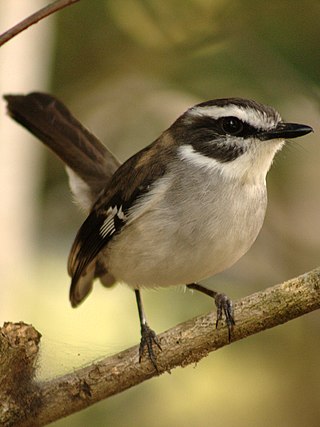
Poecilodryas is a genus of passerine birds in the Australasian robin family Petroicidae.

Trochocercus is a genus of bird in the family Monarchidae. Described by Jean Cabanis in 1850, the name Trochocercus is a combination of the Greek words trokhos meaning "circular" or "round" and kerkos, meaning "tail".

The oriole whistler, also known as the yellow-throated whistler, is a species of bird in the family Pachycephalidae, which is endemic to the Solomon Islands (archipelago).
The cinnamon-breasted whistler is a species of bird in the family Pachycephalidae. It is endemic to Obira in the Maluku Islands. Formerly, some authorities considered it to be a subspecies of the rufous whistler, while others continue to classify it as a subspecies of the drab whistler.

Pitohui is a genus of birds endemic to New Guinea. The birds formerly lumped together as pitohuis were found by a 2008 study that examined their evolutionary history on the basis of the genetic sequences to have included birds that were quite unrelated to each other. They have since been separated into other genera.
The Baliem whistler or Balim whistler is a species of bird of the whistler family Pachycephalidae that is endemic to New Guinea.















